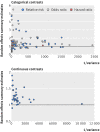Obesity and gynaecological and obstetric conditions: umbrella review of the literature
- PMID: 29074629
- PMCID: PMC5656976
- DOI: 10.1136/bmj.j4511
Obesity and gynaecological and obstetric conditions: umbrella review of the literature
Abstract
Objective To study the strength and validity of associations between adiposity and risk of any type of obstetric or gynaecological conditions.Design An umbrella review of meta-analyses.Data sources PubMed, Cochrane database of systematic reviews, manual screening of references for systematic reviews or meta-analyses of observational and interventional studies evaluating the association between adiposity and risk of any obstetrical or gynaecological outcome.Main outcomes Meta-analyses of cohort studies on associations between indices of adiposity and obstetric and gynaecological outcomes.Data synthesis Evidence from observational studies was graded into strong, highly suggestive, suggestive, or weak based on the significance of the random effects summary estimate and the largest study in the included meta-analysis, the number of cases, heterogeneity between studies, 95% prediction intervals, small study effects, excess significance bias, and sensitivity analysis with credibility ceilings. Interventional meta-analyses were assessed separately.Results 156 meta-analyses of observational studies were included, investigating associations between adiposity and risk of 84 obstetric or gynaecological outcomes. Of the 144 meta-analyses that included cohort studies, only 11 (8%) had strong evidence for eight outcomes: adiposity was associated with a higher risk of endometrial cancer, ovarian cancer, antenatal depression, total and emergency caesarean section, pre-eclampsia, fetal macrosomia, and low Apgar score. The summary effect estimates ranged from 1.21 (95% confidence interval 1.13 to 1.29) for an association between a 0.1 unit increase in waist to hip ratio and risk endometrial cancer up to 4.14 (3.61 to 4.75) for risk of pre-eclampsia for BMI >35 compared with <25. Only three out of these eight outcomes were also assessed in meta-analyses of trials evaluating weight loss interventions. These interventions significantly reduced the risk of caesarean section and pre-eclampsia, whereas there was no evidence of association with fetal macrosomia.Conclusions Although the associations between adiposity and obstetric and gynaecological outcomes have been extensively studied, only a minority were considered strong and without hints of bias.
Published by the BMJ Publishing Group Limited. For permission to use (where not already granted under a licence) please go to http://group.bmj.com/group/rights-licensing/permissions.
Conflict of interest statement
Competing interests: All authors have completed the ICMJE uniform disclosure form at www.icmje.org/coi_disclosure.pdf and declare: no support from any organisation for the submitted work; no financial relationships with any organisations that might have an interest in the submitted work in the previous three years; no other relationships or activities that could appear to have influenced the submitted work.
Figures



References
-
- NCD Risk Factor Collaboration (NCD-RisC). Trends in adult body-mass index in 200 countries from 1975 to 2014: a pooled analysis of 1698 population-based measurement studies with 19·2 million participants. Lancet 2016;387:1377-96. 10.1016/S0140-6736(16)30054-X pmid:27115820. - DOI - PMC - PubMed
-
- Project E-P. European perinatal health report. Health and care of pregnant women and babies in Europe in 2010. 2010; http://www.europeristat.com
-
- Aune D, Navarro Rosenblatt DA, Chan DS, et al. Anthropometric factors and endometrial cancer risk: a systematic review and dose-response meta-analysis of prospective studies. Ann Oncol 2015;26:1635-48. 10.1093/annonc/mdv142 pmid:25791635. - DOI - PubMed
-
- Aune D, Navarro Rosenblatt DA, Chan DS, et al. Anthropometric factors and ovarian cancer risk: a systematic review and nonlinear dose-response meta-analysis of prospective studies. Int J Cancer 2015;136:1888-98. 10.1002/ijc.29207 pmid:25250505. - DOI - PubMed
-
- Poorolajal J, Jenabi E. The association between BMI and cervical cancer risk: a meta-analysis. Eur J Cancer Prev 2016;25:232-8. 10.1097/CEJ.0000000000000164 pmid:25932869. - DOI - PubMed
Publication types
MeSH terms
Grants and funding
LinkOut - more resources
Full Text Sources
Other Literature Sources
Medical
